
Related
Topics
Guests
- Aimee Allisonpresident of Democracy in Color and founder of She the People. She won an honorable discharge as a conscientious objector in the First Gulf War.
The first night of the two-part 2020 presidential debate kicked off Wednesday night with a focus on the economy, healthcare, immigration, gun control, Iran and climate change. It was a historic night with three female candidates taking part: Senators Elizabeth Warren of Massachusetts and Amy Klobuchar of Minnesota and Congresswoman Tulsi Gabbard of Hawaii. It marked the first time more than one female candidate appeared in a major political party debate in the United States. We speak with She the People founder Aimee Allison about the women in the race and foreign policy in Afghanistan and Iran. Allison won an honorable discharge as a conscientious objector in the First Gulf War.
Transcript
AMY GOODMAN: This is Democracy Now! I’m Amy Goodman, with Nermeen Shaikh.
NERMEEN SHAIKH: One of the most heated moments of Wednesday’s Democratic debate came when Congresswoman Tulsi Gabbard of Hawaii took issue with Ohio Congressman Tim Ryan’s call for the United States to stay engaged in Afghanistan, where the U.S. has been fighting since 2001.
REP. TIM RYAN: I don’t want to be engaged. I wish we were spending all this money in places that I’ve represented that have been completely forgotten and we were rebuilding. But the reality of it is, if the United States isn’t engaged, the Taliban will grow. And they will have bigger, bolder terrorist acts. We have got to have some presence there. As Congresswoman—
REP. TULSI GABBARD: The Taliban was there long before we came in.
REP. TIM RYAN: Yeah. And they were—
REP. TULSI GABBARD: They’ll be there long before we leave.
REP. TIM RYAN: Yeah, exactly. Well, they were. And they were flying—
REP. TULSI GABBARD: We cannot keep U.S. troops deployed to Afghanistan, thinking that we’re going to somehow squash this Taliban, that has been there—
REP. TIM RYAN: I didn’t say—
REP. TULSI GABBARD: —that every other country that’s tried it has failed.
REP. TIM RYAN: I didn’t say “squash” them. I didn’t say “squash” them. When we weren’t in there, they started flying planes into our buildings. So, I’m just saying right now, we have an—
REP. TULSI GABBARD: The Taliban didn’t attack us on 9/11. Al-Qaeda did.
REP. TIM RYAN: Well, I understand—I understand that.
REP. TULSI GABBARD: Al-Qaeda attacked us on 9/11.
REP. TIM RYAN: I understand that. I under—I under—
REP. TULSI GABBARD: That’s why I and so many other people joined the military, to go after al-Qaeda.
REP. TIM RYAN: I understand that.
REP. TULSI GABBARD: Not the Taliban.
CHUCK TODD: Go ahead, Congressman. Finish up. Ten seconds.
REP. TIM RYAN: The Taliban was protecting those people who were plotting against us. All I’m saying is, if we want to go into elections and we want to say that we’ve got to withdraw from the world, that’s what President Trump is saying.
CHUCK TODD: OK.
REP. TIM RYAN: We can’t. I would love for us to.
REP. TULSI GABBARD: You know who’s protecting al-Qaeda right now is Saudi Arabia.
AMY GOODMAN: So, there you have the debate between Tim Ryan and Tulsi Gabbard, congressmembers from Ohio and Hawaii.
We are also joined by Aimee Allison, president of Democracy in Color, founder of She the People. She won an honorable discharge as a conscientious objector in the First Gulf War. She’s also co-author of the book Army of None: Strategies to Counter Military Recruitment, End War, and Build a Better World.
Aimee, before we have you respond to that little debate within the primary debate last night, you’re speaking to us from Miami, Florida. You were there last night. Can you talk—can you set the scene for us and what you were most surprised by?
AIMEE ALLISON: She the People worked with New Florida Majority to assemble 400 women of color just blocks from the center where the debate was taking place. Women of color have been—long been the gauge of where the momentum behind particular campaigns and what issues are going to be important for—in this presidential primary. So, that was an exchange where, you know, we were listening and watching carefully, because the justice agenda that women of color have been advocating for as movement leaders, as well as voters, extends to foreign policy. So, along all those lines, we see that the women of color that were assembled were watching very carefully for what was indicated.
I saw that Tim Ryan, who looked angry the entire night, issued a statement criticizing Tulsi Gabbard. I don’t particularly think that either one of them in their exchange captured the spirit of what most people in this country want to see in our foreign policy, want to see a path to normalcy and to peace.
AMY GOODMAN: And, Aimee Allison, your own history as both a soldier—you were one of the first women of color to be honorably discharged from the U.S. Army as a conscientious objector. On the issue of war last night, do you think it was adequately addressed?
AIMEE ALLISON: I don’t think it was. Look, what I learned long ago as a young woman, as a medic in the military, was that sometimes you have to take a moral stand, and even if that’s difficult. What we see here is an argument between people who want to be president, who have to ask themselves at this point what kind of leadership is needed in this country. I think one of the things that we’ve discovered—and me as earning an honorable discharge as a conscientious objector—we have to really expose the need for moral courage across the board. With the women of color we’ve been organizing with She the People, we recognize that legality doesn’t mean morality, and that we have been uniquely positioned to show leadership in this moment. You know, I think that one of the things that we are going to have to look forward to in the debates and in the primary is—are those candidates who are willing to make bold assertions and to support the kind of justice politics that support not only home and abroad, economic, racial, social and gender justice. I think that’s what the base of the party is looking for at this moment.
NERMEEN SHAIKH: Well, Aimee, this debate took place in the—the backdrop was, of course, this escalating tension between Iran and the United States, the Trump administration. And last night, when the candidates were asked whether they would back the 2015 nuclear deal negotiated by the Obama administration in its form then, Senator Cory Booker was the only one who said he would not. So, your response to that?
AIMEE ALLISON: Well, I think that his response was fair. I mean, Cory Booker had a very good night. And I think to show the nuance and understanding that the United States should push forward in renegotiating the deal—I mean, I think he said, “Yeah, we need to go from the 2015 agreement and forward, but to explore what that deal might look like.” It was one of the moments that set him apart on the debate stage.

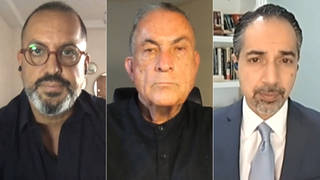
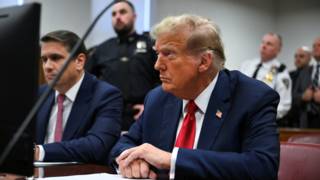
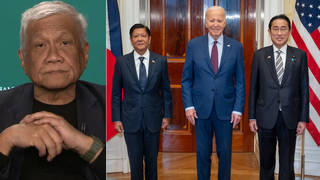
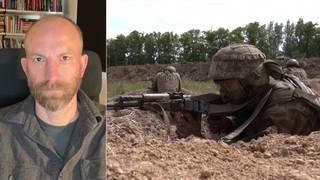





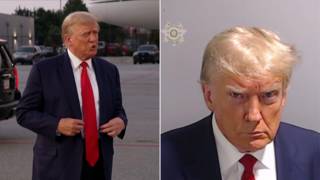
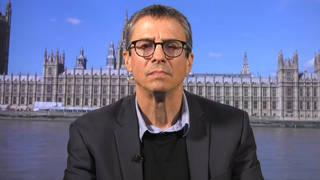
Media Options